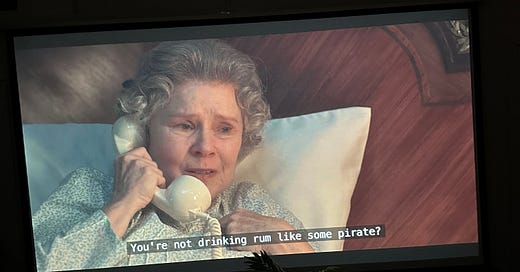Tools
This is Western Coffee—notes on building the creative body. Last time: Orbits. The whole series is here. Please share this email; you can sign up free below.
Yesterday morning, I got up, took the dog out to pee (I have Luke this week; Leia is with James at the house) and put him back in the crate, and sat down in front of the mirror in my work room.
“Hello, brain,” I said aloud in the predawn gray. “Thank you for trying to protect me.”
The protection, in this case, is some acute pain in my left hip that showed up on a long run 11 days ago. I had to stop well short of my planned distance, and limp to the subway. That might not sound very protective. But, thanks to a tool that I’ve been developing for a decade, that’s how I’m able to see it. And what would once have felt like a rather savage act of fate—landing two weeks before the New York City Marathon, after a year free of any such impediments—now feels like an invitation into my psyche. Someone in there needs some attention.
This approach to that kind of pain is a tool. I’ve been thinking about my tools because of a recent conversation with a friend who was struggling through something with a romantic partner. My first question, when she had explained the situation, was “What are his tools?” I meant this broadly—social connection, exercise, meditation, therapy, whatever—but the question has lingered with me, and it has come to feel much more specific. We all develop adaptations to get us through the moments when our edges don’t quite meet up, when we’re fractured by fear or anger or conflict, inward or outward. Some of these are palliative—the third beer, the Netflix binge. Some strengthen our relationship to the pure being deep inside us, equipping us to move through difficulty. And some confront and engage the problem itself as a step toward repair. Any of them may resemble the tools of other people around us. But—in how we engage it, in what it does, and especially in how we refine it—each is really ours alone.
So. What are your tools? I don’t mean this in a generic way. I mean: Who, when you talk to them on the phone, leaves you more resilient? I mean: Which class at the gym makes you powerful? I mean: What kind of novel lifts you off this plane? I mean: Who elevates you to tears?
Good tools work regardless of what else is going on—regardless of the severity of the stressors or the scale of the problem. Good tools require us to invest more energy when we’re strong, and then they have our backs when we’re weak. Good tools evolve as our self-knowledge does, not the self of favorite color or dream house Pinterest or partisan identification but the self who underneath all of this has always been wide-eyed and gurgling like a baby, fascinated by the fact that will never fail to shock an unjaded mind: that consciousness exists instead of void.
We—we—will not heal until we’ve located these powers within ourselves and made them ours. That is the fact of it. So if you’re worried about next week, take action in the world, yes, and fight for the outcome you believe in. But do not do that at the cost of finding and building your tools.
Kindly send me your thoughts, questions, and provocations: dmichaelowen@gmail.com. And say hi on Instagram.



